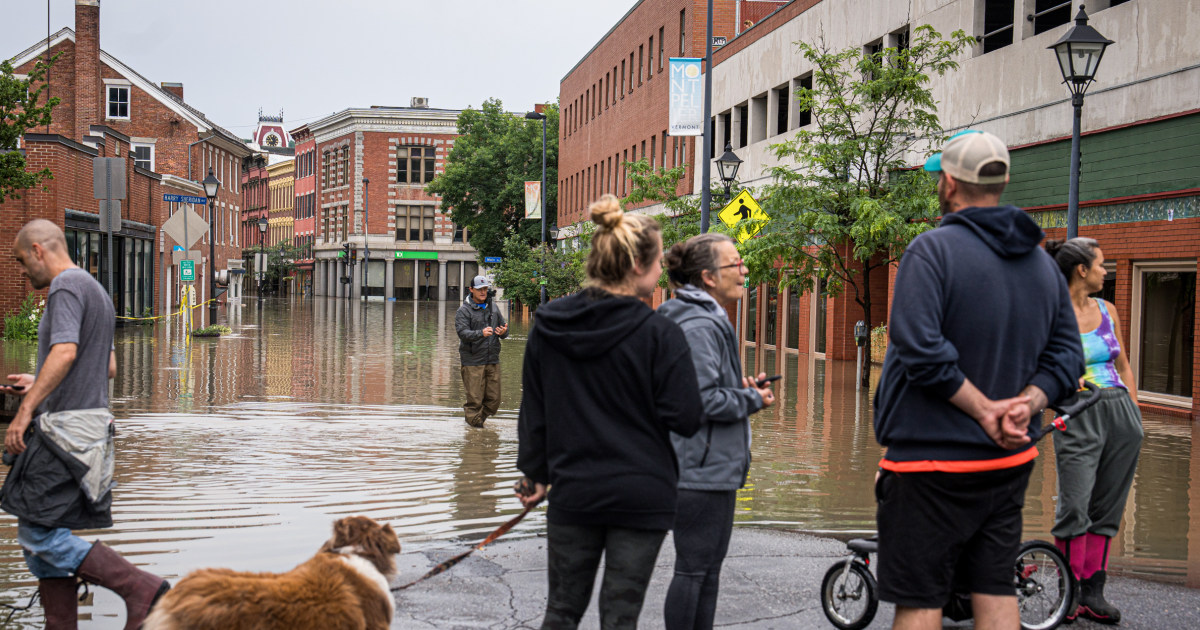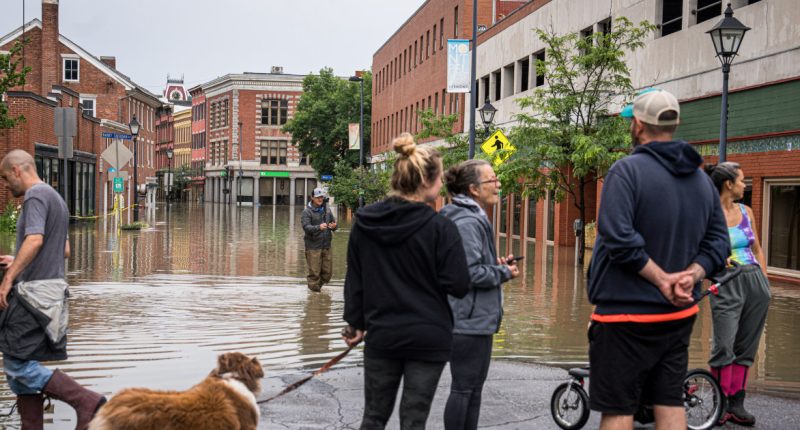
Vermont lawmakers passed a bill this week that is designed to make big fossil fuel companies pay for damage from weather disasters fueled by climate change.
The legislation is modeled after the Environmental Protection Agency’s superfund program, which requires the companies responsible for environmental contamination to either clean up sites themselves or reimburse the government for the costs of work to do so.
Vermont’s bill, referred to as its Climate Superfund Act, would similarly mandate that big oil companies and others with high emissions pay for damages caused by global warming.
The amounts owed would be determined based on calculations of the degree to which climate change contributed to extreme weather in Vermont, and how much money those weather disasters cost the state. From there, companies’ shares of the total would depend on how many metric tons of carbon dioxide each released into the atmosphere from 2000 to 2019.
The law passed with just three no votes in Vermont’s state Senate in early April, followed by approval in the state House on Monday. The Senate will deliver a final vote later this week before the bill heads to Republican Gov. Phil Scott’s desk.
State Sen. Anne Watson, a co-sponsor of the bill, said she hopes that if the law goes into effect, it pushes big oil companies “to become purveyors of renewable energy sources and keep fossil fuels in the ground.”
It’s the first bill of its kind to pass in the United States. Massachusetts, Maryland and New York are pursuing similar policies, but only New York’s bill has made it through a chamber of its state legislature. Sens. Bernie Sanders, I-Vt.,and Chris Van Hollen, D-Md., also tried to introduce comparable legislation at the federal level, as part of the infrastructure bill passed in 2022, but that didn’t make it into the final draft.
In Vermont, the money fossil fuel companies pay would go toward modernizing infrastructure, weatherproofing schools and public buildings, cleaning up from storms, and addressing the public health costs of climate change.
The bill hinges on the ability to assess how much damage in Vermont has been caused by climate change — an accounting that would rely on a line of research known as attribution science. Over the last 20 years, researchers have honed their ability to confidently model the degree to which human influence has contributed to the severity and frequency of extreme weather.
“We’re able to say very clearly, ‘We would not be experiencing these intense global temperatures without human-caused climate change and the history of carbon pollution,’” said Andrew Pershing, vice president for science at Climate Central, a nonprofit that conducts attribution science research.
Pershing pointed to extremely heavy rains as something scientists can attribute to a warmer atmosphere.
“New England has had a 60% increase in the heaviest precipitation days,” he said, explaining that “for every 1 degree Fahrenheit increase in temperature, you get a 4% increase in the amount of water vapor that the atmosphere can hold.”
In Vermont specifically, this past winter was the warmest ever recorded. It came after the state experienced record-breaking rainfall in July, which caused catastrophic flooding. The storm cost the Northeast close to $2.2 billion, according to an estimate from the National Oceanic and Atmospheric Administration.
State Sen. Russ Ingalls, a Republican, said he cast one of the three “nay” votes because he anticipates the law would trigger major litigation and thinks the money the state would have to spend in those legal battles could be put to better use.
“A decision was made to go to war with corporations that probably have as many attorneys as we do citizens,” he said. “We will be squashed like a bug.”
The law is indeed expected to face intense challenges in court once Vermont determines which companies will be asked to pay, and how much. Past superfund cases have been lengthy, complex and expensive.
The American Petroleum Institute, one of the major lobbies for the interests of oil and natural gas companies, sent a letter to the state Senate opposing the bill, saying it “violates equal protection and due process rights by holding companies responsible for the actions of society at large.”
The group declined to offer further comment beyond the letter.
But Watson said the Vermont attorney general told lawmakers that she is “ready and willing to defend this law.”
“The science linking climate change to severe weather damage is robust enough to withstand scrutiny,” she added.
Other supporters of the bill similarly say that Vermonters should not be on the hook for the costs of responding to and preparing for climate change.
“You see towns across the state underwater, and communities and businesses financially devastated. The reality of the climate crisis just really comes crashing home,” said Ben Edgerly Walsh, climate and energy program director for the Vermont Public Interest Research Group, which has been advocating for the bill’s passage. “These are facts that we are dealing with in real time that we need the financial resources to deal with.”
Once the bill makes it to Scott’s desk, he could still choose to veto it, though the governor has not indicated one way or another whether he is likely to do that.
If he does veto the bill, Vermont law stipulates that it would be sent back to the Legislature, where it would have to pass in the Senate and House again with a supermajority to override the veto. Given that the bill already passed with a supermajority — and that Scott has faced several veto overrides during his tenure — it would be expected to do so again.
Source: | This article originally belongs to Nbcnews.com









